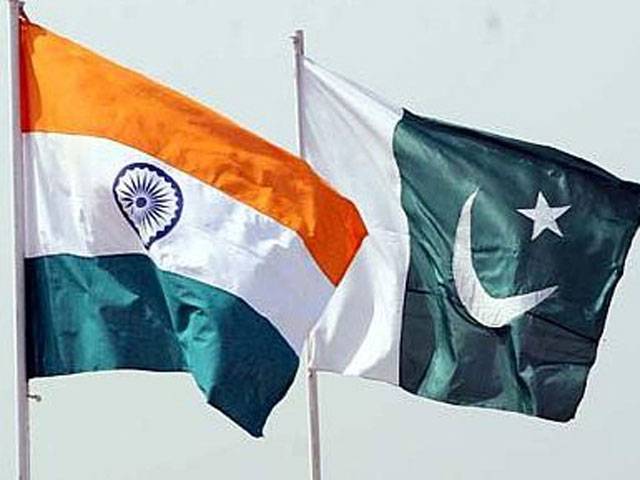Islamabad -The intelligentsia from India and Pakistan came together on Friday to prepare a unanimous draft urging both sides to do away with the history of bitter past and explore new areas of cooperation on multiple fronts.
The joint statement issued upon the conclusion of the 3rd Islamabad Dialogue suggests intelligence sharing “at the highest level” between Islamabad and New Delhi against terrorism while urging the security establishments of the two sides not to allow “Afghanistan to become another contentious bilateral issue.” It asks the two establishments to “share their perceptions on Afghanistan, and should take each other into confidence regarding their concerns about the post-2014 Afghanistan.”
The draft also recommends to implement commitments made on bilateral trade by both countries and relaxation on travel restrictions for people-to-people contacts, besides voicing concern that agreed confidence building measures (CBMs) on the cross LoC (Line of Control) travel were not being implemented properly. The document notes that there should be “no reluctance in keeping the dialogue on Kashmir on the forefront of bilateral discussions and all channels in this regard must be kept open.”
The unanimous declaration welcomes the resumption of back channel diplomacy by the two states.
Annually held since 2011, the Islamabad Dialogue, organised by the Jinnah Institute, in collaboration with the New Delhi’s Centre for Dialogue and Reconciliation (CDR), comes in line with track-II diplomacy between both the neighbours. The 3rd Islamabad Dialogue (July 4-5) saw the active participation of intelligentsia comprising of journalists, foreign affairs experts, former military men, defence analysts, politicians, ex-diplomats, and representatives from different segments of civil society.
“We appreciate the encouraging statements made by both prime ministers recently in the local media. The opportunity thus presented should be exploited to the full,” said the 22-point draft resolution signed by the dialogue participants, with reference to the revival of peace initiatives between the South Asian neighbours with the arrival of the present government in Pakistan.
“We find that increase in India-Pakistan bilateral trade is encouraging despite the escalation of tensions on the LoC in January 2013 and urge that the implementation of commitments made on bilateral trade should be expedited by both countries,” the document referred to the continuity of trade between the two states amidst tensions at the LoC earlier this year in an encouraging sign demonstrating willingness on part of the neighbouring states to come closer despite facing challenges from hostile military establishments at the respective sides.
The document urges Pakistan to consider allowing overland transit through the Wagha-Attari border for trade between India and Afghanistan.
Regarding its concern on the non-implementation of CBMs on cross-LoC travel, the 3rd Islamabad Dialogue in its unanimous document, notes, “We are concerned that the agreed CBMs on cross-LoC travel are not being properly implemented. It is essential that the leadership in both countries issue a public directive to the relevant authorities on the ground to take urgent steps to simplify and expedite procedures.
We emphasise that cross-LoC travel should not be restricted to divided families, but rather be made permissible for all residents of Jammu and Kashmir. The authority to issues travel permits should rest with the local administrations on both sides.” It hopes that the “growing prospects of Indo-Pak trade should also help ensure that cross-LoC trade is not restricted to Kashmir, but is part of the wider, bilateral trade regime.” Asking the two sides to shun the policy of violence against each other, the joint declaration recommends that the two countries should make joint efforts for the rehabilitation of refugees from both sides of the LoC.
“We recommend that both countries put an end to extra-judicial killings and torture as instruments of investigation and law enforcement-that both countries cooperate on the issues of human rights and ensure that captured prisoners are treated with dignity as per international norms.”
Other important recommendations made in the draft include giving greater voice to women in the Pak-India peace process, creation of a joint India Pakistan watchdog to monitor human rights abuses and suggest mechanisms to prevent state violations, nationality verification of prisoners/detained fishermen within three months, institutionalising a “no arrest of fishermen” policy and establishing marine risk reduction centres on part of both countries with the ability to communicate with each other, implementation of the recommendations made by the India Pakistan Judicial Committee on Prisoners, availability of consolidated prisoners’ database on the internet, and emphasising on the media in both countries to report issues of prisoner release “with caution so as to avoid jingoistic reportage.”
Friday, April 26, 2024
Pak-India intelligentsia suggests info sharing against terrorism

Vloggers Shiraz, Muskan cross 2m followers on Instagram
12:27 AM | April 26, 2024
Achakzai stresses collective wisdom to address country's crises
12:27 AM | April 26, 2024
IHC puts off cipher case hearing until April 30
12:26 AM | April 26, 2024
Nawaz Sharif convenes PML-N Punjab meeting tomorrow
12:25 AM | April 26, 2024
ECP reinstates PTI-backed MNA from NA-81 Gujranwala
12:24 AM | April 26, 2024
Academic Uprising
April 24, 2024
Cooperation Momentum
April 24, 2024
Facing Reality
April 24, 2024
Absent Academia
April 23, 2024
Murree’s Redemption
April 23, 2024
Ending animal suffering
April 25, 2024
AI governance
April 25, 2024
AI concerns
April 25, 2024
Population paradox
April 24, 2024
Unveiling differences
April 24, 2024
ePaper - Nawaiwaqt
Advertisement
Nawaiwaqt Group | Copyright © 2024





